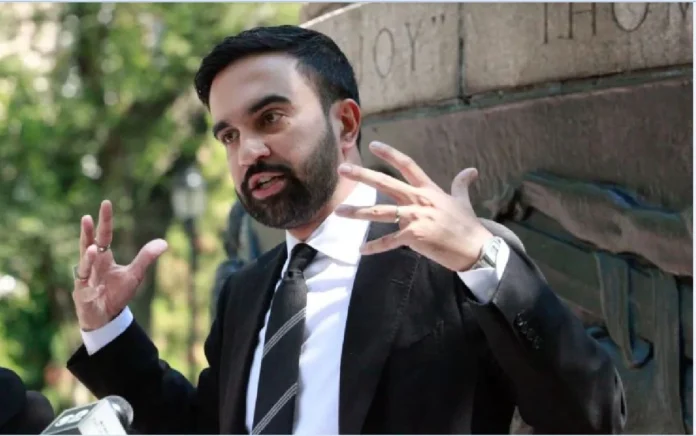By Kenneth Tiven
The leadership accomplishments of Indians in America are visible across fields—from science and technology to medicine and law—but few stories blend politics and drama like that of Zohran Mamdani. His life could be the plot of a Bollywood biopic: a young man of Indian heritage, born in Africa, raised in America, now poised to lead one of the world’s greatest cities.
At 33, Mamdani is widely expected to win the November 4 New York City mayoral election, defeating former governor Andrew Cuomo, who is attempting a political comeback. Polls indicate a decisive lead for Mamdani, whose multicultural background and bold ideas have captivated millions. He holds passports from India, Uganda, and the United States, embodying a new kind of global citizen.
A STORY BORN IN CINEMA
Mamdani’s story begins in Kampala, Uganda, in 1991—the same year his mother, acclaimed filmmaker Mira Nair, released Mississippi Masala, a film about love across racial lines and displacement. His father, Mahmood Mamdani, is a distinguished academic and public intellectual. Art, intellect, and politics were part of his upbringing.
Three decades later, that cultural legacy seems to have ripened into political purpose. In America’s largest city, Mamdani’s primary election victory marked a generational and ideological shift. His campaign drew strength from younger voters and immigrant communities tired of establishment politics and hungry for equity.
As a Democratic Socialist, Mamdani advocates Scandinavian-style governance—“capitalism without greed,” as he calls it. His focus on affordable housing, healthcare, and family welfare resonates with those who believe government must do more than protect markets; it must protect lives.
THE POLITICAL CROSSROADS
Odd-year elections in the US rarely attract global attention. Yet the 2025 New York City race has become a national litmus test. With President Donald Trump again in office and openly hostile to “blue cities,” the stakes are high. One veteran journalist who fled Castro’s Cuba put it this way: “Young New Yorkers see Mamdani as a modern-day Zorro who fights for the underdog.”
Trump’s reaction has been predictably caustic. On his social platform, he called Mamdani a “Communist” for focusing on affordability and threatened to withhold federal funds from New York City if he wins. “He’ll have problems with Washington like no mayor in history,” Trump warned, vowing to block money for what he called Mamdani’s “fake promises”.
THE TRUMP FACTOR
Trump’s feud with New York is longstanding. Since his first term, he has sought to punish cities offering sanctuary protections for immigrants. His administration’s latest orders direct the Justice Department and Homeland Security to track and penalize jurisdictions that resist federal deportation efforts.
For Mamdani, these threats are both political and personal. Trump’s discomfort with an articulate, Muslim, Indian-origin leader heading his native city speaks volumes about the cultural and racial undertones shaping modern American politics.
THE MAKING OF A MODERN POLITICIAN
Unlike many first-time candidates, Mamdani arrives with political experience. A graduate of Bowdoin College in Maine, he has already served two terms in the New York State Legislature, where he built a reputation for principled activism and pragmatic policymaking. His politics are informed not by ideology alone, but by empathy and lived experience.
His campaign slogan—“A Fairer City for All”—has become both rallying cry and promise. For a generation that grew up amid rising costs and racial divides, Mamdani represents possibility: proof that America’s narrative of inclusion is still being written.
If this were a movie, it might have been called The Bollywood Mayor—and the young Amitabh Bachchan could well have played the lead.
—The writer has worked in senior positions at The Washington Post, NBC, ABC and CNN and also consults for several Indian channels


